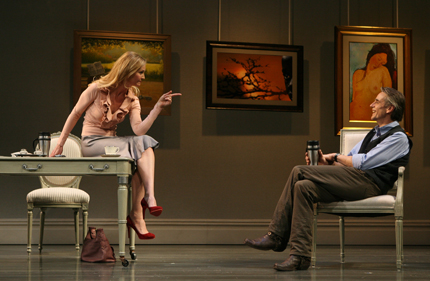Let’s try to summaries what happens during the process that leads the actor from ideas, understandings and intuitions to the full physical realization of a character. These may vary from ‘he’s a dancing athletic tough guy who clowns a lot’ (Mike, in Berkoff’s East) to ‘She’s elegant, magnificent, stately, and everything she does is calculated for effect’ (Lady Bracknell, the grand dowager in The Importance of being Earnest) Two conditions must be established to help the actor to be a creative physical performer: first, that whatever the demands of the part, the actor is truly relaxed, something that has to be stated over and over again. From this state springs economy of movement, expressiveness and simplicity. The actor Robert Lindsay demonstrated this in the television series G.B.H., a funny political satire by Alan Bleasdale. His character was a manic, ambitious, fast-talking local politician, an opportunist and greedy crook, whose chosen public persona was that of an amusing and laid-back sophisticate.

Gradually, as the pressures mount on him, Murray, the character, begins to disintegrate, mentally, verbally and physically, and becomes a mass of uncoordinated jumps, dartings, tics and twitches, body language that told us volumes. The great skill of Lindsay’s performance was that this bodily falling apart was done with absolute fluidity and lightness, perfect coordination of miscoordination. The impression was of a man of straw blowing apart, the dissolving of a man whose personality was a total sham. This is a very good example of the need for beautiful coordination and complete relaxation when playing a neurotic and buffeted character. Book now your free acting class at The Actor’s Group Orlando, read more on the page.
So the actor must work hard and exercise for control and flexibility of all parts of the body, separately and together; meaning may be conveyed with the entire body or merely the raising of an eyebrow. Suppleness, strength, balance, a sense of weight and also of lightness, knowing where your centre is are all important. The body must be able to respond to the thought and the instinct, to be able to act and re-act. The attention you give to your physical abilities will help you to be a better, more watch able actor of greater range. Parallel with these skills are the qualities of repose and economy. The actor can only succeed with demeanor, body language, facial expression and physical actions where these have a meaning derived from the text, arising truly from character and situation. Compare two kinds of action, the egregious Beverly from Abigail’s Party giving her hilarious demo of how to put on and wear lipstick, and Lady Macbeth’s sleepwalking scene, where the most important action is her hand washing: the hands writhe and tear and fret at each other in the attempt to remove that damning, eternal blood.
True and telling visual images are vitally important. We must create the physical world of our characters, especially in the historical play, the story of people whose climate, habits and customs are different from ours. They are specific people in a particular place and time, not human stereotypes. In Noel Coward’s Present Laughter, a comedy of the 1940s, there is a minor character, Henry Lypiatt, a West End impresario. Apart from a certain acerbic wit and ruthlessness, he is more of a function than a character, and doesn’t have a lot of dialogue. A thankless chore for the actor, you may think, but he is a man of his time, when actors were still gentlemanly and flamboyant (which often concealed private lives of some seaminess) and impresarios were actors writ large: figures of awesome power, masters of the revels. So perhaps the actor might go nap on Henry’s clothes, demeanor and manners. An immaculate suit, in a rather risqu color, a French or Italian suit, horror of horrors! The lapels are too wide, the turn-ups too deep! And, my dears, he’s got a gardenia in his buttonhole! A wide-brimmed velvet hat, like the brigand-hero of an opera; very tight, very expensive gloves; an exquisite pale floral silk necktie and beautiful two-tone shoes. He smokes oval Turkish cigarettes in a long black holder and carries a silver-topped cane. His ever-charged cigarette-holder, except when he raises it to his lips, is held most precisely at least a foot away from his body, so that his clothes and person shall not be contaminated by smoke; it’s also a Field Marshal’s baton with which he makes imperious gestures. An amusing epicene figure of authority and considerable interest, achieved by the actor’s attention to the details of physical presentation, and a creature that by his physical presence evokes a feeling of the theatre and the period. A man precisely in his time and place.
In short, the use of costume, body and movement completes and rounds off a performance, and must be as full of truthful insight as the actor’s speech.